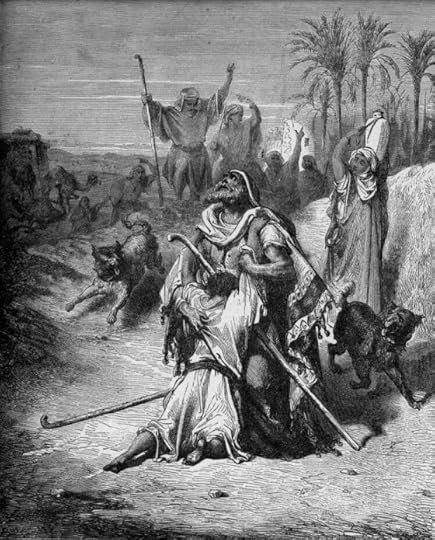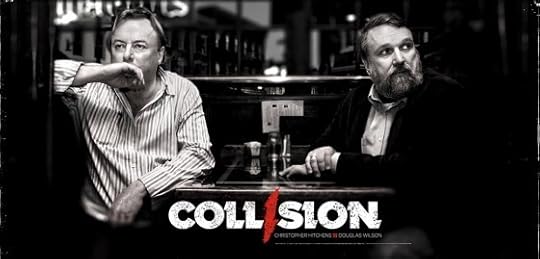Justin Taylor's Blog, page 290
September 9, 2011
The Gospel at Ground Zero

From Russell Moore's Christianity Today cover story, "The Gospel at Ground Zero":
The full force of the trauma from events like September 11 doesn't come from contemplating the violence done to strangers or even "the nation." Only when we envision ourselves and our loved ones on the scene, as children transplant themselves into nightmare stories, does the severity hit home. We imagine hearing those jihadists screaming prayers as the plane plummets from the sky, or being trapped in a smoke-filled stairwell, or leaping from a window in terror. The phenomenon here is precisely what causes us to flinch when we see blood on the pavement after a car accident. We are reminded of what scares us, of what could happen to us, too.
And so it is with the gospel. The story of Jesus records a persistent strain of denial in the life of Simon Peter. Virtually every time Jesus speaks of his impending execution, Peter insists that such trauma will never happen on his watch (Matt. 16:22; John 13:37). Of course, this not only suggests Peter's empathy with his teacher. It also demonstrates the apostle's refusal to face up to his fear that he might be tempted to protect his own skin.
Though he doesn't unveil it all at once, Jesus refuses to shield Peter from the awful truth. In one of the Bible's most pitiful narratives (John 13:36-38), Peter ostentatiously promises to protect the Messiah from harm. "I will lay down my life for you," he blusters.
Jesus responds: "Really? You're going to fight for me? Before the rooster crows, you will deny you even know me—not once but three times."
Jesus revisits the trauma on Peter. When the rooster crows, Jesus happens to be passing by, and he looks at his friend, prompting Peter to cry bitterly (Luke 22:60-62). Even in the famous restoration of Peter, after Jesus' resurrection, Jesus seems eager to remind Peter of his previous denial. He questions his disciple's love three times. He meets with him around a charcoal fire (John 21:9), precisely the setting of the denial itself (John 18:18).
Then Jesus presses the trauma further. What Peter fears most—the shame and torture of crucifixion—is exactly what Jesus assures him will happen. He will stretch out his hands and be led where he doesn't want to go (John 21:18). Peter will have the kingdom he so longs for—with all of its glory and peace—but his immediate future is skull-shaped.
The ugly reality of crucifixion looms over the lives of Christ's followers today, as it did Peter's life. In the gospel, we are confronted with the unvarnished horror of ourselves—damned and cursed and exiled. We find ourselves ensnared in the curse itself—in Jesus, writhing in torture on a stake (John 3:14).
Gathering each week, we reenact the horror of Jesus' sacrificial death. In baptism, we see the flood of God's judgment against sin (1 Pet. 3:20-21). At the Lord's Table, we swallow and digest the sign of our Lord's torn skin and spattered blood.
The preaching of sin and judgment is traumatic, to be sure. There's some danger of presenting the gospel as mere condemnation—exactly what Jesus says it's not (John 3:17). And an overwhelming emphasis on sin can breed a morbid obsession with one's own wickedness. This, of course, leads not to repentance but to despair, which is exactly where the satanic powers want us.
At the same time, censoring the gospel's painful realities doesn't lead to tranquility. Like our children with the wild things out there, we know intuitively that a Day of Judgment is coming, even as we try to keep the fear submerged. The Scriptures tell of an unholy spirit who accuses our consciences, and whose accusations resonate with us because they are accurate (Rev. 12:10). The Devil holds us in captivity through our innate fear of death and judgment (Heb. 2:14-15). That pretty well sums up the classic definition of "terrorism." And the only thing that can free us from our enslavement to Satan, and to our sin, is blood (Rev. 12:11).
In the word of the Cross, God tells us he knows all our traumas, our insurgencies, our secrets—and that he has already executed them at Golgotha. We need not fear hell, then, not because there isn't one, but because—if we are found in Christ—we have already been through all of that. We are free. And whenever our consciences accuse, the gospel takes us away from denial or preoccupation and right back to Ground Zero—to the Cross.
September 8, 2011
Past, Present, and Future

"As far as the east is from the west, so far does he remove our transgressions from us."—Psalm 103:12
"Jesus Christ is the same yesterday and today and forever."—Hebrews 13:8
Charles Spurgeon on the parable of the prodigal son:
This poor young man, in his hungry, faint, and wretched state, having come a very long way, had not much heart in him. His hunger had taken all energy out of him, and he was so conscious of his guilt that he had hardly the courage to face his father; so his father gives him a kiss, as much as to say, "Come, boy, do not be cast down; I love you."
"Oh, the past, the past, my father!" he might moan, as he thought of his wasted years; but he had no sooner said that than he received another kiss, as if his father said, "Never mind the past; I have forgotten all about that." This is the Lord's way with His saved ones. Their past lies hidden under the blood of atonement. The Lord saith by His servant Jeremiah, "The iniquity if Israel shall be sought for, and there shall be none; and the sins of Judah, and they shall not be found: for I will pardon them whom I reserve."
But then, perhaps, the young man looked down on his foul garments, and said, "The present, my father, the present, what a dreadful state I am in!" And with another kiss would come the answer, "Never mind the present, my boy. I am content to have thee as thou art. I love thee." This, too, is God's word to those who are "accepted in the Beloved." In spite of all their vileness, they are pure and spotless in Christ, and God says of each one of them, "Since thou wast precious in My sight, thou hast been honourable, and I have loved thee. Therefore, though in thyself thou art unworthy, through My dear Son thou art welcome to My home."
"Oh, but," the boy might have said, "the future, my father, the future! What would you think if I should ever go astray again?" Then would come another holy kiss, and his father would say, "I will see to the future, my boy; I will make home so bright for you that you will never want to go away again." But God does more than that for us when we return to Him. He not only surrounds us with tokens of His love, but He says concerning us, "They shall be My people, and I will be their God: and I will give them one heart, and one way, that they may fear Me for ever, for the good of them, and of their children after them: and I will make an everlasting covenant with them, that I will not turn away from them, to do them good; but I will put My fear in their hearts, that they shall not depart from me." Furthermore, He says to each returning one, "A new heart also will I give you, and a new spirit will I put within you: and I will take away the stony heart out of your flesh and I will give you an heart of flesh. And I will put My spirit within you, and cause you to walk in My statutes, and ye shall keep My judgments, and do them."
Community: Taking Your Small Group off Life Support
Brad House introduces his new book Community: Taking Your Small Group off Life Support (Re:Lit, Crossway).
Children with Cancer
The LORD gives.
The LORD takes away.
Blessed be the name of the LORD.
—Job 1:21
The heartbeat of the Christian life: "sorrowful yet always rejoicing."
—2 Cor. 6:10
2 Corinthians 4:8-10 explains that we are "always carrying in the body the death of Jesus, so that the life of Jesus may also be manifested in our bodies." And the result looks like this:
The Dying of Jesus
The Life of Jesus
afflicted in every way
but not crushed
perplexed
but not driven to despair
persecuted
but not forsaken
struck down
but not destroyed
He who testifies to these things says, "Surely I am coming soon." Amen. Come, Lord Jesus!
—Revelation 22:20
The (Graphic Novel) Book of Revelation App
Tim Challies has a very interesting interview with Chris Koelle, the artist behind The Revelation App, a graphic novel adaption of the book of Revelation.
An excerpt:
To be honest, at first, the idea seemed (to me) laughable because of its ambitious scope and complexity, and then the prospect simply became paralyzing. A fully-illustrated, moment-by-moment visualization of the entire Book of Revelation had never really been done before. In the end, it was a once-in-a-lifetime opportunity, and after some time I agreed to take up the challenge.
Hitchens on 9/11: "Simply Evil"; Wilson on Hitchens: "Simply Incoherent"

Christopher Hitchens, writing in Slate on 9/11, argues:
The proper task of the "public intellectual" might be conceived as the responsibility to introduce complexity into the argument: the reminder that things are very infrequently as simple as they can be made to seem. But what I learned in a highly indelible manner from the events and arguments of September 2001 was this: Never, ever ignore the obvious either. To the government and most of the people of the United States, it seemed that the country on 9/11 had been attacked in a particularly odious way (air piracy used to maximize civilian casualties) by a particularly odious group (a secretive and homicidal gang: part multinational corporation, part crime family) that was sworn to a medieval cult of death, a racist hatred of Jews, a religious frenzy against Hindus, Christians, Shia Muslims, and "unbelievers," and the restoration of a long-vanished and despotic empire.
Douglas Wilson, writing at The Gospel Coalition, praises (most of) the article: "All this is Hitchens doing what Hitchens does best, and he does it for most of his article. And then, fulfilling the promise of the title ('Simply Evil'), he veers into incoherence at the very end when he only had about two column inches to go." Specifically, Hitchens says that "The regimes of Saddam Hussein and Kim Jong Il and Mahmoud Ahmadinejad fully deserve to be called 'evil.'" Wilson of course agrees. But who is Hitchens to say?
Hitchens has to borrow capital from the Christian worldview to make this work. Wilson explains:
Evil? Imagine there's no heaven, Lennon urged us. It's easy if you try. No hell below us—nothing to kill or die for. If you say things like this, certain other things follow. Hitchens has been in the front ranks of the new militant atheists, and he has made a great show of being the kind of contrarian who is willing to say absolutely anything, provided it only be true. We have to grow up, Hitchens has said. We have to reject outmoded concepts. We have to get rid of the idea that there is a God in heaven, telling us the difference between right and wrong. But if these things be true, then there are other things that follow. For some reason, Hitchens is willing to affirm the premises but will not own any of the obvious conclusions. You cannot throw away your suitcase at the beginning of your journey, and then, as you are nearing the end of the trip, pull out all the things that you packed in it. There may be shrewd ways of avoiding baggage handling fees, but that's not one of them.
Keep reading . . .
Ask a Calvinist
Rachel Held Evans has been doing a series of interviews where her readers can ask various folks (a Mormon, a Catholic, an Atheist, an Orthodox Jew, etc.) anything they want, and the person answers the most popular questions. If you don't mind the mixed metaphors, I bit the bullet and jumped into the hot seat and gave it my best shot.
You can go here to read my answers to the questions—which include whether or not you have to be Reformed to to be saved or to be an evangelical, how God can be just if someone has no possibility of salvation, what I find uncomfortable about Calvinist soteriology, why engage in mission if limited atonement and irresistible grace are true, whether I would have done things differently in retrospect with regard to the Love Wins controversy, what I'd say to someone who hasn't been chosen for salvation, why Calvinism is different from fatalism, and personal advice for someone teetering on the edge of faith.
September 7, 2011
Prayer at Ground Zero
 Jay Sekulow, chief counsel for the American Center for Law and Justice, writes in a USA Today opinion piece:
Jay Sekulow, chief counsel for the American Center for Law and Justice, writes in a USA Today opinion piece:
New York City Mayor Michael Bloomberg's decision not to invite clergy of any faith to commemorate the anniversary Sunday at Ground Zero is a mistake. The move is deeply offensive to the many Americans who find solace and healing in prayer.
In an open letter to Mayor Bloomberg Mr. Sekulow calls this a "damaging policy" and argues that "prayer is a powerful source of comfort for many who are still suffering—and it should be a part of the 9/11 anniversary."
Michael Horton observes that "It's not a question of whether prayer at public occasions of this kind is sanctioned by our Constitution, but, for Christians at least, whether we can participate (much less encourage) such acts of 'non-sectarian' worship."
With regard to Sekulow's critique, Horton think it "betrays assumptions about prayer that, in my view, can only trivialize this sacred act in the long run." He asks:
Is the purpose of prayer mainly therapeutic: personal and national catharsis? Is it basically horizontal-human-centered (whether in individual or national images)? Or is it a solemn act of "calling on the name of the LORD" (i.e., Yahweh, the Father of Jesus Christ)? Does such an act have a personal object? Is that personal object the God who is revealed in Scripture as the Holy Trinity? Is the prayer directed to the Father, through the mediation of the incarnate Son, in the power of the Holy Spirit by whom we confess "Jesus as Lord"?
Imagine Elijah calling for a revival by trying to negotiate a public prayer or perhaps series of public prayers led by the prophets of Baal and the prophets of Yahweh. Israel, after all, has always been a religious nation. Isn't it more important for the nation to acknowledge its piety than to become too obsessed with the theological specifics? The nation was divided, after all, and the point is to bring the people together through prayer, to bring them consolation in the face of national disaster. Of course, this isn't how the story plays out at Mount Carmel, as the God of Israel proved that he alone is God and Baal is a helpless idol.
We don't live under the old covenant, driving the prophets of Baal through with the sword. Rather, we have the privilege of religious freedom for true and false worship in this country. Nevertheless, we do not expect the state to create opportunities for the advance of Christ's kingdom through his means of grace. . . .
Prayer is also an act of witness. What are we testifying to when we seek state acts of generic devotion to the Unknown God? To what-or whom-are we witnessing when we give the impression that people can find consolation from any "God" apart from the Father who is known only in his Son and is otherwise a judge who will not let sinners go unpunished? True prayer arises as a Spirit-given response to the Word that proclaims God's righteous judgment and gracious forgiveness in Jesus Christ.
You can read the whole thing here.
On Self-Promotion
Below is a good counter-balancing word from John Piper (in 2008) on the difference between self-promotion and seeking to be an influence. Here's the biggest takeaway, in my opinion: get, value, and listen to friends who are willing to tell you the truth.
The Good Gift of Marriage
This illustration moved me when I first heard Ben Patterson give this address at the 2004 Desiring God conference "Sex and the Supremacy of Christ."
Justin Taylor's Blog
- Justin Taylor's profile
- 44 followers



